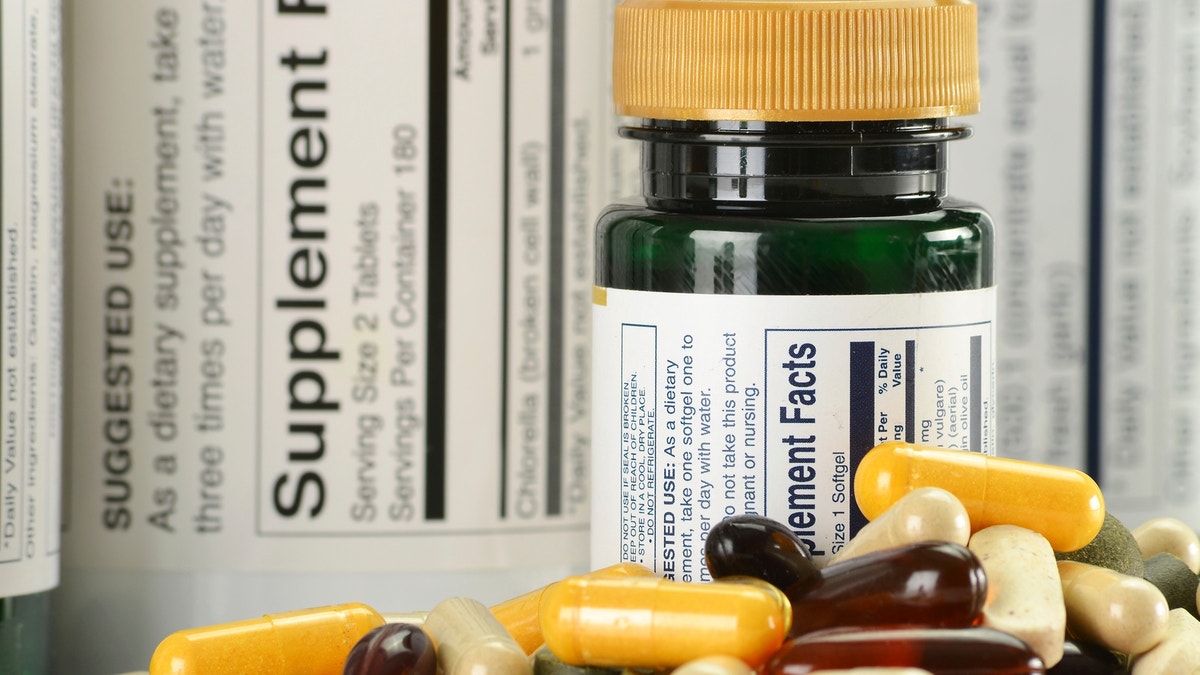15 common supplement ingredients that could make you seriously sick
{{#rendered}} {{/rendered}}
Composition with variety of dietary supplements capsules and containers (monticelllo)
From omega-3s to prenatal vitamins, supplements can provide major benefits. But a new analysis from Consumer Reports reveals many ingredients found in popular supplements could seriously compromise your health.
Unlike prescription drugs and OTC medicines like ibuprofen or aspirin, "supplements are not tested for safety and efficacy by the FDA," said Ellen Kunes, who leads the health and food team at Consumer Reports. And of the more than 15,000 supplements in the US marketplace, only a few hundred undergo spot-checking by regulatory authorities, she said.
That's pretty scary when you consider some common supplement ingredients can cause kidney and liver damage—among many other significant health issues, Kunes said.
{{#rendered}} {{/rendered}}In particular, consumers need to watch out for diet supplements (like garcinia cambogia), said Dr. Mark Moyad, director of complementary and alternative medicine at the University of Michigan Medical Center.
"Almost anything for weight loss should be a concern because most of them work by increasing blood pressure or heart rate while also trying to increase metabolism," he explains.
Moyad looked at the Consumer Reports no-no list, and said he agrees with "virtually all" of their inclusions and concerns. He added that the levels of heavy metals like lead, arsenic, and mercury that turn up in supplements are also a big problem.
{{#rendered}} {{/rendered}}Related: Do You Know What's In Your Supplements? A New Investigation Says Probably Not.
"There are times when people may need supplements—like if a doctor recommends or prescribes something for a condition like macular degeneration," Kunes said. But it's important to understand that supplements carry risks just like other medications.
According to the Consumer Reports analysis, there are 15 supplement ingredients in particular that you need to watch out for.
{{#rendered}} {{/rendered}}Here are the ones to avoid, and the types of products that are most likely to contain them.
Yohimbe
Where You Might Find It: In supplements marketed to treat low libido and erectile dysfunction, depression, and obesity
{{#rendered}} {{/rendered}}Risks: Increased BP and heart rate, headaches, seizures, liver and kidney problems, panic attacks, and death.
"Yohimbe has countless quality control issues as well as unhealthy heart effects, Moyad said. "Why this is still allowed on the market, I have no idea."
Aconite
{{#rendered}} {{/rendered}}Where You Might Find It: In supplements marketed for the treatment of inflammation, gout, and joint pain (Try these anti-inflammatory foods instead.)
Risks: Nausea, vomiting, weakness, paralysis, breathing problems, heart problems, and death
Caffeine powder
{{#rendered}} {{/rendered}}Where You Might Find It: In supplements marketed for the treatment of attention issues, athletic performance enhancers, and weight loss supplements
Risks: Seizures, heart arrhythmia, cardiac arrest, and death—particularly when combined with other stimulants
Chaparral
{{#rendered}} {{/rendered}}Where You Might Find It: In supplements marketed for weight loss, inflammation, infections, skin rashes, and cancer
Risks: Kidney problems, liver damage, and death
Coltsfoot
{{#rendered}} {{/rendered}}Where You Might Find It: In supplements marketed to relieve coughs, sore throat, laryngitis, bronchitis, and asthma
Risks: It's a possible carcinogen, and it may also cause liver damage.
Related: Exactly What To Eat When You Have A Cold Or Flu
{{#rendered}} {{/rendered}}Comfrey
Where You Might Find It: In supplements marketed for the relief of cough,heavy periods, stomach problems, chest pain, and cancer
Risks: It's a possible carcinogen, and it may also cause liver damage.
{{#rendered}} {{/rendered}}Germander
Where You Might Find It: In supplements marketed for weight loss, fever, arthritis, gout, and stomach problems
Risks: Liver damage, hepatitis, and possibly death
{{#rendered}} {{/rendered}}Greater celandine
Where You Might Find It: In supplements marketed to treat stomachaches
Risks: Liver damage (Here are 4 supplements that don’t mix with meds.)
{{#rendered}} {{/rendered}}Green tea extract powder
Where You Might Find It: In supplements marketed for weight loss
Risks: Dizziness, ringing in the ears, worsening glaucoma or anemia, liver damage, elevated blood pressure, and death
{{#rendered}} {{/rendered}}Kava
Where You Might Find It: In supplements marketed to reduce anxiety or insomnia
Risks: Liver damage, worsening depression or Parkinson's disease, and impaired driving
{{#rendered}} {{/rendered}}Lobelia
Where You Might Find It: In supplements marketed to reduce respiratory problems and help you quit smoking
Risks: Nausea, vomiting, diarrhea, tremors, rapid heartbeat, confusion, seizures, hypothermia, coma, and death
{{#rendered}} {{/rendered}}Methylsynephrine
Where You Might Find It: In supplements marketed for weight loss, increased energy, and improved athletic performance
Risks: Heart rate and rhythm abnormalities and cardiac arrest, especially when combined with other stimulants. This is one of those weight lossingredients Moyad said to watch out for.
{{#rendered}} {{/rendered}}Pennyroyal oil
Where You Might Find It: In supplements marketed for breathing problems or digestion issues
Risks: Liver or kidney failure, nerve damage, convulsions, and death
{{#rendered}} {{/rendered}}Red yeast rice
Where You Might Find It: In supplements marketed to lower cholesterol or prevent heart disease. However, this is the one ingredient on the Consumer Report list that Moyad doesn't agree with.
"Red yeast rice has undergone countless clinical trials showing that it could be an option for statin-intolerant patients," he said. (Here are 12 foods that lower cholesterol naturally.)
{{#rendered}} {{/rendered}}Risks: Kidney and muscle issues, liver problems, hair loss, and heart issues
Usnic acid
Where You Might Find It: In supplements marketed for weight loss and pain relief
{{#rendered}} {{/rendered}}Risks: Liver injury
